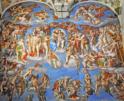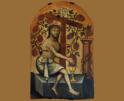
Faith
Jesus' obedience and Judas' betrayal present opposite poles of the divine-human relationship. For Jesus' obedience reveals the fullness of divine love, while Judas' betrayal reveals the corrupting depths of humanity's sinfulness and self-love.

Sullivan
Is 50:4-7
Ps 22:8-9, 17-18, 19-20, 23-24
Phil 2:6-11
Mk 14:1-15:47
The sacred events of Holy Week beg the question: Why did Jesus, the Son of God, have to suffer a cruel, unjust death on a cross? Was Jesus' suffering the only means by which humanity could be reconciled to friendship with God?
Jesus was obedient to the point of death, even death on a cross. With these words, St. Paul focuses on the ultimate reason that Jesus embraced his passion and crucifixion. Obedience to the will of God that opened the way for an outpouring of divine love on the world led Jesus to his suffering and death on the cross. Obedience was the foundation of Jesus' life. In Jesus' obedience we come to understand who God really is and who we really are, made in the image of God who loves us to the point of death, even death on a cross.
In the Gospel account of the Lord's passion, we follow in the footsteps of the way of the cross. Soon after Jesus celebrates the Passover with his disciples, he arrives in Gethsemane to pray. During a time of deep, anguished prayer, Jesus speaks to his heavenly Father with words of obedient love: "take this cup away from me but not what I will but what you will." Obedience to the will of God becomes the fullest expression of divine love.
After Jesus expressed his obedience to God, the startling event of his betrayal follows. Judas arrives in Gethsemane with a crowd armed with swords and clubs. With a traitorous kiss, Judas betrays Jesus into the hands of those who seek to kill him in exchange for silver. Betrayal takes center stage in the final encounter of Jesus and his disciples.
Jesus' obedience and Judas' betrayal present opposite poles of the divine-human relationship. For Jesus' obedience reveals the fullness of divine love, while Judas' betrayal reveals the corrupting depths of humanity's sinfulness and self-love. Human sinfulness, weakness, and pride are forms of betrayal as humanity turns away from friendship with God to lesser things or self-love.
Thanks be to God that betrayal is not the final word on the human condition. God's love and mercy is the final word that speaks louder than every small or great human infidelity and betrayal. This is the good news of these holy days we prepare to enter.
This Holy Week may we find in Jesus' passion, death, and resurrection the victory of God's love turned to us personally as we bring our weaknesses and betrayals before the redeeming cross of Jesus Christ, and say with gratitude and faith, "speak to me, Lord."
Question: How will Jesus' passion, death, and resurrection transform me this Holy Week?
- Jem Sullivan holds a doctorate in religious education and is an associate professor of Catechetics in the School of Theology and Religious Studies at The Catholic University of America in Washington, D.C.
Recent articles in the Faith & Family section
-
The kingdom of ChristJaymie Stuart Wolfe
-
Pilgrims of hope -- Holy Year of 2025Father Robert M. O’Grady
-
Honor Mothers at Home and In the MissionsMaureen Crowley Heil
-
On the vineScott Hahn
-
What is the church's position on the treatment of animals?Jenna Marie Cooper


















